Chapter 1
Wartime & Ascendency
At the beginning there was light! Very bright light in the delivery room of the maternity at the hospital in Ghent-Flanders -Belgium, one Sunday early morning of May 1941, in the middle of World War II.
I had made my way through a narrow tunnel, out of the warm, wet and protective womb of my dear mother, in which I had been “manufactured”. Although that was a safe place – rather tight however – I insisted on getting out, be independent, which happened when they eventually decided to cut that cord loose.
After the tapping on the back, the holding my head down by my feet, in this rather cold room, I uttered a cough and started to breathe!!!!! What an event! Now I was on my own and enjoying it! They wrapped me up in some rough stuff, from head to toe and laid me on the kind and exhausted lady who went to pieces in the effort to give birth to this pretty little brat.
No, I didn’t scream, I was so happy and filled with this exhilarating light, inside: grateful to be there: here I come, watch it I’m no “spring chicken” and I’m not a “chicken” at all: see: I chose to land in the middle of World War II with no fear at all!
By the way, I always wondered how any couple could be so irresponsible as to start procreating (I even got a brother 2 years later) in those circumstances: bombing all around town, sirens to send people in their shelters or cellars out of which they might never come out again. Troupes of soldiers, tanks and trucks – armed to the teeth and even shooting around; but we survived.
We left the big townhouse to move to the countryside: that was fun, animals, a lake to dip in, and even a swimming pool in the Chateau of some friends.
My parents had only been married for 7 months even though they had known each other for 7 years, until the “accident” came: me!
The ‘happy’ father, a young handsome lawyer, freshly graduated from Law school at the Ghent Flemish University, eventually got to marry this beautiful young grand-daughter of a wealthy industrialist.
In those days fancy high class balls were organized to get young ‘family’ girls to meet their potential husbands. Those worldly young men and girls had to learn to dance.
Young Lydia was sent to dance classes where she fell for the first dandy who chatted her up: Leon, son of a respectable but modest Director of a large printing company in Ghent. He was the third son of four living with his parents in a modest neighborhood of the town.
Although he had been steadily courting young Lydia with dignity and often in the company of Queen Mother, he was a keen lover and took some practice with as many beauties as he could keep up with in the meantime until one day they (Lydia & Leon) had met unattended. So the shocking situation was discovered and a hasty marriage organized… in the middle of WW2! The next day, I was told, they had to move some furniture to a large townhouse they had rented on one of the most prestigious avenues of Ghent. That happened with a wooden cart with 2 wheels pushed by hand by our young solicitor: of course nothing motorized on wheels was available anymore, apart from German trucks or confiscated cars for the officers of the “Wehrmacht”.
Of course it had to be a “large” house, because one floor was to be devoted to the “Lawyers practice”: the office, waiting room + potential secretary’s office.
Another consideration to be taken into account was of course the Mother in law: the poor soul was alone in those dreadful war circumstances. It was of course a humane gesture to protect her by letting her live in with the newlyweds in this large house. She would of course, contribute towards the rent, as in the daily cost of living… One never knew what was ahead in those troublesome days. Most of the furniture of the house was kindly offered by Mother in law. Grandmother Emily, Lydia’s mother, was alone indeed and that’s quite a story!
Therefore we need to go up a couple of generations: back to the great- grandfather (Emily’s father in law). Mr. Joseph Carly*, 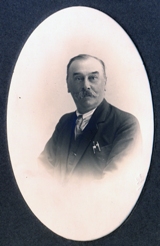 creator of the flourishing textile confection business, together with his faithful wife, made him one of the most wealthy and successful businessmen in Ghent.
creator of the flourishing textile confection business, together with his faithful wife, made him one of the most wealthy and successful businessmen in Ghent.
They manufactured aprons, ladies’ blouses and luxury lingerie. They employed many workers and employees and were living a life of luxury. Yes, in those days all the middle class women wore aprons all day and every day, at school all the pupils were wearing aprons, even clerks and workers or employees were wearing them: it was a goldmine.
Aprons and blouses were on one floor, luxury lingerie on the next floor. I remember when I was a teenager having gone through all the drawers full of beautiful lace, Calais lace in particular: what a heavenly delight! They made nighties and underskirts with 15 cm large edging of Calais lace at the bottom and the shaped top of these garments: it was so beautiful and elegant. Nobody ever wears those anymore. Of course, there was so much handwork to put this subtle “dentelle” (lace) together, embroidered on the silk that it would not be profitable enough to make anymore, let alone find the precious fingers to achieve this.
Back to the Great-grandfather and his wife Mr. & Mrs. Carly, the brilliant creators of this industry. They had a son, called Henry, a spoiled rotten bugger who had grown up in luxury, servants, cars, money galore, and totally incapable of anything constructive or even assistance in anything at all other than spending money on games, booze, women or whatever.
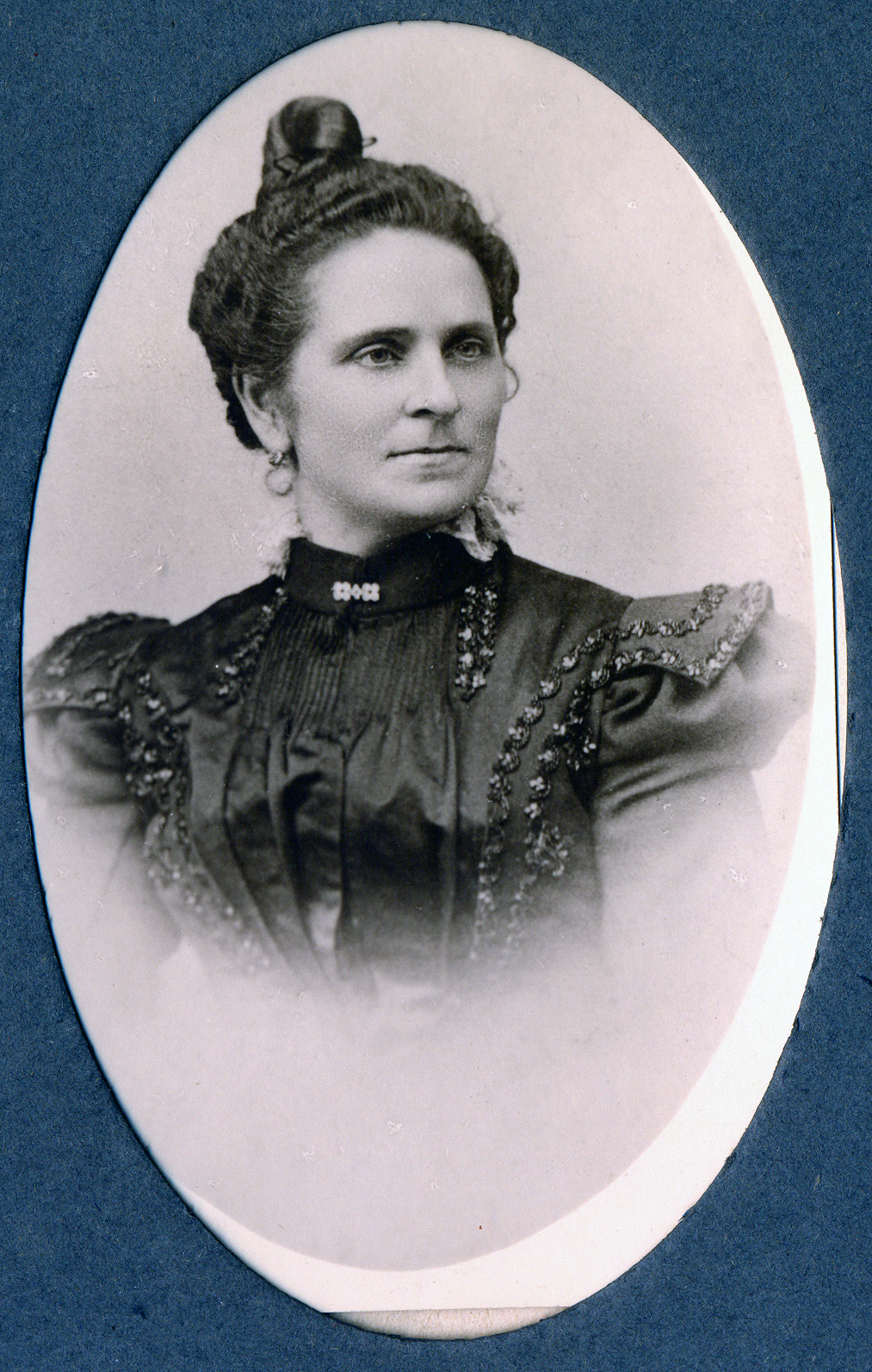 Madame Carly*, great-grandmother having reached a ripe old age, became very ill and was about to pass away. She deplored the idea that all these years of hard labor in this business and this fortune and formidable beehive she had contributed to create, would get lost in the hands of her miserable son, when her husband would die, perhaps in not too long a time… he also had reached old age.
Madame Carly*, great-grandmother having reached a ripe old age, became very ill and was about to pass away. She deplored the idea that all these years of hard labor in this business and this fortune and formidable beehive she had contributed to create, would get lost in the hands of her miserable son, when her husband would die, perhaps in not too long a time… he also had reached old age.
She decided to act, and on her deathbed, she called the best worker she had in the factory, a good honest, hardworking healthy Flemish girl, good looking as well. She begged her to promise, before she died, that she would accept marriage to her son, and as such co-inherit the business and set it forth as it should.
Emily of course could not refuse, and although she only had ever caught a glance of the son, she felt it was her duty and a good way to “keep her job”.
So the mother passed away, Emily married Henri*, 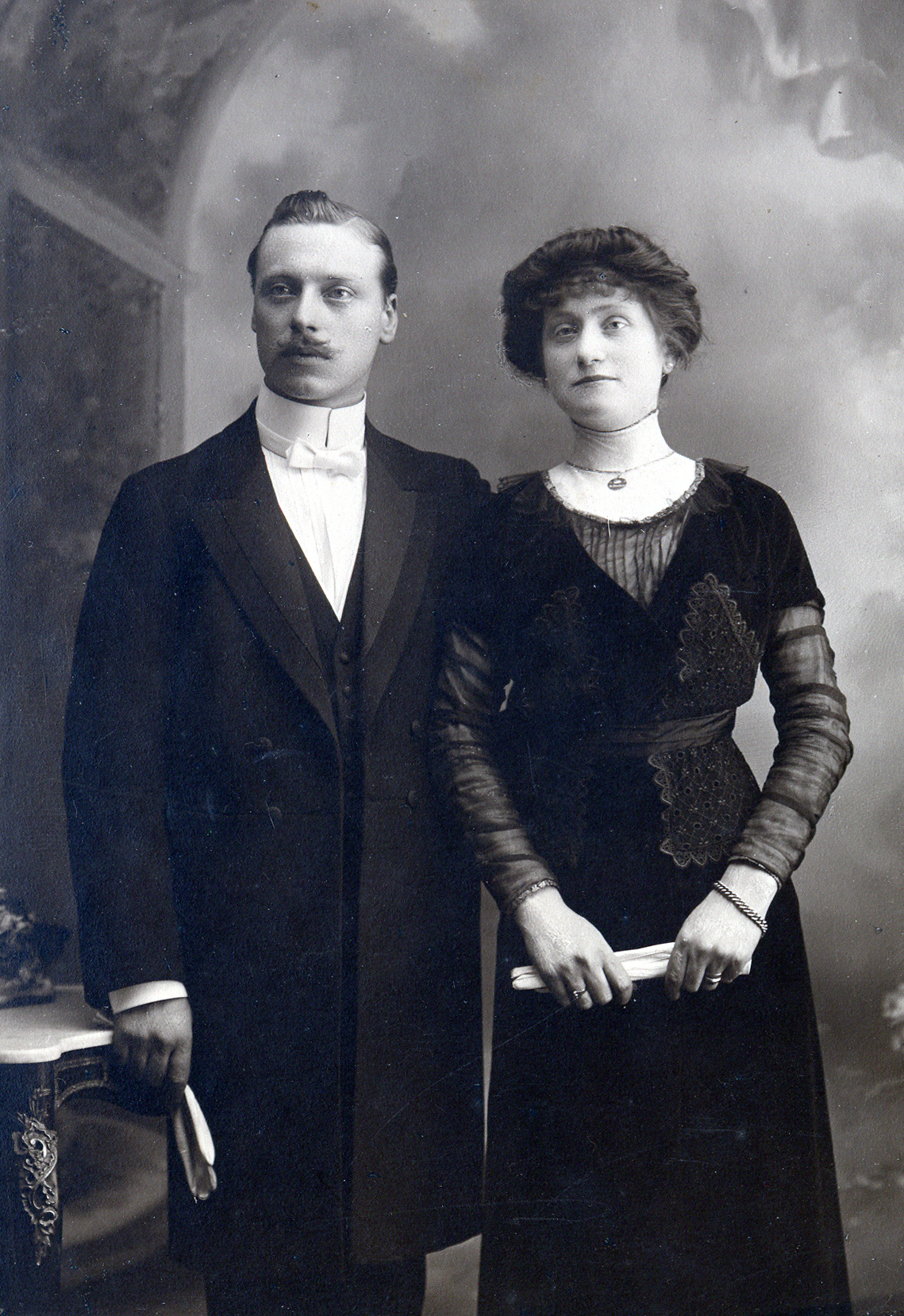 and became Mrs. Carly, and while Mr. Joseph Carly – father, was still alive, ‘kept her job” as a “cutter” of aprons.
and became Mrs. Carly, and while Mr. Joseph Carly – father, was still alive, ‘kept her job” as a “cutter” of aprons.
She had of course to move into the Big House* adjacent to the factory, which in the meantime had been completely renovated, and was magnificently refurbished by the best and most expensive interior decorator in town.
The factory was so modern and newly equipped that 30 years later it was still at top level of confection business
The large staff took care of the house, maids, chauffeur, housekeeper, governess, linen & clothes caretaker, were in charge.
Emily’s new imposed husband was not too intrusive – he only appeared occasionally from his trips to Monte Carlo or Cannes, that were his favorite places for his enjoyment which consisted of casinos, grand hotels, women, glories and big spending. Every so often the pockets had run dry and he stopped by in Ghent, “home”, for refill in cash. While he was there he hastily also honored his wife, by the way…. resulting in a pregnancy, the last thing Emily wanted: a daughter! She called her Lydia.
As a baby, poor Lydia was handed over to a nanny, and at 5 years old, was sent to a posh boarding school with nuns where she stayed the full term, sometimes the only one left in the school during holidays. If and when she was allowed to come home she was to stay put in a corner of the factory, with some kind of sawing job to accomplish, like repairing her stockings, so much so that a couple of the workers feeling sorry for her, took some of her chores home and brought them back, done, the next day.
Her entire youth was spent in three expensive Catholic boarding schools in succession, both in Belgium and in Luxemburg, which was total agony for her. Therefore, she would never want to hear anymore about religion, nuns or anything Catholic in her life.
One day, when she had been allowed to come home, she was 15, she met a gentleman in the house, who seemed at home in the place: she politely greeted him with “Bonjour Monsieur”…. and found out from the maid that it was her father! Nobody had bothered to introduce him.
Let’s take a leap back to the death of great-grandmother: the inconsolable widower had a very lovely, young and very big breasted maid: another one of those healthy Flemish country girls, who was extremely attentive to her favorite boss. She expressed great pity for him after the loss of his beloved wife, and spent more time trying to console him than to work in the house.
The dear old man, of course extremely grateful for so much attention, and ignoring his old age manhood – a strong man after all – fell for this young beauty expressing more than generosity by not being able to keep his hands in his pockets.
The clever girl, called Rosine, in short Rose, drove him up the wall and managed rather shrewdly to end up marrying the good old man, her elder of more than 50 years. Subsequently Rose’s strategy and attentions soon took care of the old heart of the very old man and he died, leaving her as another co-heir of the fortune and the business.
There was Emily, now alone to handle this big business, not having a clue about accounts, management, marketing or promotion. On top of that, she found herself with a fancy ex-maid who had rapidly plunged into the character of a wealthy dame of the high society of Ghent. Working and taking care of the business, she knew even less than Emily, but did know how to spend money galore and went on leading a luxury life, playing bridge, organizing big dinners and parties, going to the opera, theatre and all the occupations of the rich ladies. She even started to give money away to the poor, a generosity that the local priest knew what to do with.
She, of course, actively participated in the house’s renovation, and was particularly interested in having a very special bathroom for herself as she spent most of the morning in that room adjacent to her huge ballroom type bedroom. The bathroom was all in black shiny tiles with gold-plated fittings and a stained glass central roof piece: Hollywood!
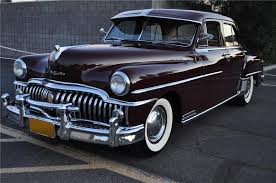 The house was filled with Persian rugs, magnificent china vases and statues, gold brocade curtains and silver accessories, cutlery and serving plates. She paraded around in the most expensive American-made Desoto* automobile in burgundy color with beige leather inside, with chauffeur of course, called Prosper.
The house was filled with Persian rugs, magnificent china vases and statues, gold brocade curtains and silver accessories, cutlery and serving plates. She paraded around in the most expensive American-made Desoto* automobile in burgundy color with beige leather inside, with chauffeur of course, called Prosper.
As she was attractive, generous, beautiful and very worldly – she never was a sad widow – on the contrary, men were soon very present in her life. One of the sales representatives of the company had recently lost his wife and he was stranded with two almost adult children. As he was another one of those Casanovas, who was rather frivolous and not so keen on working, he considered that this gorgeous ‘boss’ of his, so lonely and open to company anytime, asked her to marry him … and she did.
Albert was his name. He of course, rapidly became part of the Big House, stopped working as a representative of the Firm, and while he was moving in, he also brought his two lazy young adult children along with his luggage, to settle in with him. And this new “menagerie” lived happily ever after on the money of the Company.
Albert was a hunter, from Wallonia, and as he didn’t work anymore, he wanted to have special hunting grounds for himself and his pals. In the Ardennes, in Wallonia which was the French speaking part of Belgium there were large forests and beautiful landscapes. A few proprietors own large parts of the woods, and they let these grounds to hunters for considerable prices.
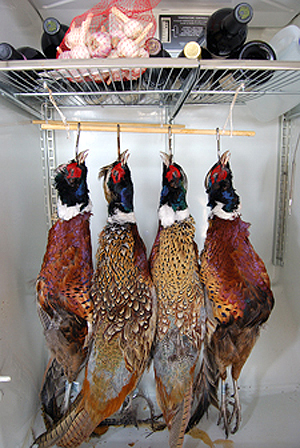 Albert picked some of the best spots and rented them for years for which Rose paid, or rather the company paid. Now and then he would bring some game home: boars, deer, pheasants* etc…, they would be hung in the garage to “mature” until they stank and then were good to eat! And grand dinners were organized for the “gallery” to eat the trophies. This is why I refuse to ever eat venison.
Albert picked some of the best spots and rented them for years for which Rose paid, or rather the company paid. Now and then he would bring some game home: boars, deer, pheasants* etc…, they would be hung in the garage to “mature” until they stank and then were good to eat! And grand dinners were organized for the “gallery” to eat the trophies. This is why I refuse to ever eat venison.
Albert’s children, not very active, had no idea of what they could be doing to fill their lives. The son, played the photographer for a while; he even tried to make it a job, with limited success. He finally, as his father did, married a daughter of a rich industrialist and lived along with her and a little girl…and booze.
Annie, the daughter managed to find herself a husband, a surgeon, rather famous in the city, for various reasons, one of which was his competence as a surgeon…. the others were less glorious -booze again. They had 3 children and, the last I heard, were divorced. So that was those 2 out of the way. We are now in the fifties. So much for a little picture of the family up to 3 generations….
The house*, in which I grew up, was a tall and narrow house* in a row on the Boulevard and had 5 floors: vast cellars under the entire house, a coal cellar that was filled from a trap on the pavement, just before the front door. Every day coal buckets were filled for the stoves.
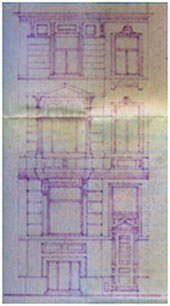 There was no central heating, only one large cooker/stove in the center of the lower ground floor, where we lived most of the time: this living area was halfway underground in the front part of the house and was, at the rear, facing south, with a terrace and a long and narrow pretty town garden outside the kitchen door.
There was no central heating, only one large cooker/stove in the center of the lower ground floor, where we lived most of the time: this living area was halfway underground in the front part of the house and was, at the rear, facing south, with a terrace and a long and narrow pretty town garden outside the kitchen door.
In the front room, the dining room, there was another coal stove. The first floor was the reception floor: first room: the lawyers office, separated by double tall sculpted doors to the middle room: reception room for dinners with guests, or waiting room for clients. The end room with large bay windows capturing the sun, also potential secretarial space… for my mother, but she did not want to work, other than in her housekeeping, although she had a living in maid and a cleaning woman twice a week. There was only a coal stove in the first room.
 No heating system anywhere else: none in the bedrooms, none in the corridors. And all the windows had single glazing. Apart from those rooms the temperature inside the house was the same as outside. In winter when it froze, the windows were covered inside, with beautiful icy compositions* from the condensation: like pictures or sculptures of ice flowers all over the windows I still wonder how one could live in this cold.
No heating system anywhere else: none in the bedrooms, none in the corridors. And all the windows had single glazing. Apart from those rooms the temperature inside the house was the same as outside. In winter when it froze, the windows were covered inside, with beautiful icy compositions* from the condensation: like pictures or sculptures of ice flowers all over the windows I still wonder how one could live in this cold.
Actually one of my strongest memories as a baby was how cold my ears were. I was of course tucked in warmly with woolen covers and pajamas, but my ears were exposed and I tried to warm them up with my hands. This habit stuck with me for many years: holding my ear to go to sleep.
Halfway up the stairs to the 2nd floor there was a single bathroom for the entire family. On the second floor 3 bedrooms: my parents’ and ours – my brother and I. Another 2 flights of stairs: 2 bedrooms: my grandmother’s and the maid’s.
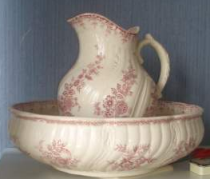 The maid was not to use the bathroom: there was a cold water tap on the landing and she had a porcelain basin* and a big jug to wash in her bedroom. It was sitting on a chest of drawers with a white marble top and a mirror, called a “coiffeuse”. I now still use this piece of furniture in my dressing room to fix my hair.
The maid was not to use the bathroom: there was a cold water tap on the landing and she had a porcelain basin* and a big jug to wash in her bedroom. It was sitting on a chest of drawers with a white marble top and a mirror, called a “coiffeuse”. I now still use this piece of furniture in my dressing room to fix my hair.
Above these rooms there was a big attic: one could see the roof tiles: no isolation what so ever and plenty of holes through which you could see the sky. One day someone had the good idea to hang a thick curtain at the bottom of the attic stairs to keep the cold wind out that was freezing up the house.
Of course all the rooms had high ceilings and therefore there was no possible way to get such a house warm.
Our children will never know their good fortune to live in centrally heated houses, with double glazing and isolated roofs, walls and ceilings.
That was Europe, not the North Pole or Siberia, but it certainly felt like that in winter. What progress to be grateful for nowadays!
Now back to World War Two.
My parents had rented a very small house, 2 rooms in the countryside in a village on the outskirts of Ghent, one reason being the difficulty of getting coal, food, and of course the bombing that was getting closer every day.
So the family went back and forth with bikes. My brother was sitting on a saddle in front of my father, and I was sitting in a basket type seat behind my mother. One day somehow I fell off this seat and nobody noticed, until they arrived in the village. Very alarmed of course, they rushed all the way back: and found me quietly sitting in the middle of the bicycle path. They told this story a hundred times to illustrate what a serene and stoic child I was: not a worry, not a fear!
In town, the boulevard was situated between 2 bridges and the Germans were madly trying to demolish all the bridges in town. Of course since the planes dropping the bombs had no precision electronic equipment; they just dropped and dropped, hoping for the best.
Every time the bombing stopped people would come out of their shelter and find their way in the rubble, glass and debris of the damaged houses. I can still see the scenery in my mind’s eye. In the cellar of our house, in 2 corners, we had manholes in the wall to be able to climb from one cellar into a neighbor’s cellar in case we were caught, or welcome neighbors in case they were. The cellars were storage spaces where several big jars were holding all sorts of food, kept in salt. There was no fridge in those days, and sometimes no electricity. In the garden we had rabbits and chicken, in case there was no more food.
But somehow we were very lucky, because my father as a successful lawyer was often paid with food instead of money, one being more precious than the latter. I’ve never asked him why he was not called to be in the army, but probably because of a health situation: when he was a student he was given some arsenic powder that the chemist mistakenly prepared, instead of a harmless digestion powder, that he swallowed and was immediately paralyzed and almost died. Somehow he miraculously survived, after this lethal dose, and his incredible survival made the medical journals. Of course that caused great damage to his stomach. Over the years it gave him some severe ulcers and ultimately the removal of his stomach in 1957…. by the related surgeon (see above) who saved his life. He lived without a stomach up to his 90th year.
During the war, one day the Gestapo came to get him and we all thought we’d never see him back again.
But before he was taken away, he grabbed some files along, as he guessed someone had denounced him out of animosity. That was the case indeed, an opponent in a court case had tried to get revenge by telling the Gestapo my father was listening to the London radio, which everybody did by the way, but the Gestapo considered it treason. Eventually they accepted his explanation and he was driven home, a free man. That was the thing about my father: he never failed to believe in his luck: he was divinely protected! He just trusted, had faith and was convinced…. although he declared himself to be a perfect atheist and was even a Freemason.
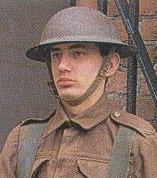 The war went by with its ups and downs: we also hosted a “Tommy” *, for a while, a British soldier, named Jim Thompson: I remember his rather shallow helmet: he used to put it on our heads for play: he was a very pleasant character full of humor.
The war went by with its ups and downs: we also hosted a “Tommy” *, for a while, a British soldier, named Jim Thompson: I remember his rather shallow helmet: he used to put it on our heads for play: he was a very pleasant character full of humor.
When the war ended there were huge celebrations, and I remember that we ran upstairs to go and hang the flag out of the upstairs balcony. I was helping the maid to do that, when suddenly there was screaming everywhere: the Germans are back! Indeed columns of tanks* and trucks appeared and the threatening sight of armed soldiers stepping along the houses, shooting at all the people hanging flags. We scrambled to draw 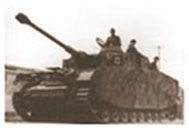 the flag inside. The maid went to lie flat on her tummy on the floor, and I ran downstairs to see what was going on. The roller blinds of the street window were not completely down and I had to look. This is when I met the blue eyes of this German soldier staring at me, until my mother got hold of me scared stiff that he would shoot me. But he didn’t. I’ll always remember his eyes… that weren’t threatening at all. Anyway, obviously this part of the German army had not heard the news of their final defeat and made a last attempt to impress!
the flag inside. The maid went to lie flat on her tummy on the floor, and I ran downstairs to see what was going on. The roller blinds of the street window were not completely down and I had to look. This is when I met the blue eyes of this German soldier staring at me, until my mother got hold of me scared stiff that he would shoot me. But he didn’t. I’ll always remember his eyes… that weren’t threatening at all. Anyway, obviously this part of the German army had not heard the news of their final defeat and made a last attempt to impress!
As for my grandmother’s business: she either stayed with us when we were in town or stayed at the Big House from the factory, but she just carried on.
At the beginning, they closed the plant, because they would not work for the German Army, but the invaders soon found out about these premises and forced them to manufacture clothes for them. So for her it was business as usual… She just pressed on and on. Between the factory and our home there were about 3 km to walk, and she fearlessly took these walks 4 times a day, at 6.30 am, 12 noon, 1.30 pm and 6.00 pm, through any kind of weather or any kind of circumstances. Not just during the war but her entire life at the factory. She would never accept to be driven. A tough woman she was!
She has never been ill in her life, nor had a single tooth filled or removed. She died at a ripe old age, after falling on a 5cm step in a supermarket. That fall broke her hips and she was put in a large plaster cast, in hospital where she died of bronchitis, because of a draft in her room. When they took of the cast after her death, the bones were all healed.
She ate a lot, eggs and bacon in the morning, with white bread and a lot of butter, full meals at lunch, soup, meat or chicken or fish, lots of potatoes, and vegetables; and another meal in the evening with more bread and cold cuts or cheese or gratins or pies, and drank coffee or beer. Everything was always cooked with butter; very little sweets or deserts. No wholegrain bread would enter the house: that was “war food”. On Friday there was fish, which I hated. The difference with now was that the food was healthy, clean and natural… the air as well! Anybody eating that much nowadays would be obese and already dead 30 years at her age.
So the war ended, the only reminder was that the frontage of the house was threatening to fall on the street. There was indeed a huge crack between the façade and the floors: it started of about 3 centimeters at the bottom and was up to an 8 cm gap between the floorboards of the last floor and the bricks of the frontage of the house. There was no choice: it had to come off and demolished because of the risk of falling by itself endangering passersby.
Plans, architects, building licenses…and financing had to be organized and before we knew it we were on the street: all the front rooms were open on the street!! Shambles inside, everything upside down, it took forever to have this fixed and very difficult to live in it, physically and morally with 2 small kids, a very demanding father and a grumbling grandmother.
And while at it the entire frontage* has been changed with large bay windows, no more balcony, nor tax on a balcony either modern metallic front door also with a big window. Now we had much clearer and more pleasant rooms.
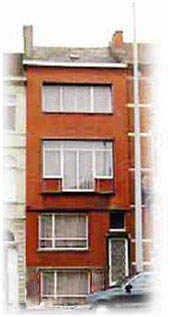 The only thing that had not been accounted for was that the big windows with single glazing, facing north were increasing the cold inside in most seasons.
The only thing that had not been accounted for was that the big windows with single glazing, facing north were increasing the cold inside in most seasons.
Then extra heaters had to be installed: that was not a luxury but a necessity.
The aftermath of the war brought quite a few other changes in our lives. The influence of the British and American soldiers, their way of life and products invaded our habits. All sorts of new things and foods appeared and were very great successes: first Coca Cola of course, chewing gum, nylon stockings, Blue Jeans, dried powdered eggs, Kraft cheese, corned beef, Boogie Woogie, etc….
I particularly loved the scrambled eggs, made from this powder I can still remember the taste of the cardboard of the packaging in the eggs, quite distinctly. This is why I have eaten, every morning of my life, scrambled eggs for breakfast, except that now they are fresh farm eggs. Most of the other stuff was not really allowed in the house: my very traditional mother didn’t trust American products.
****